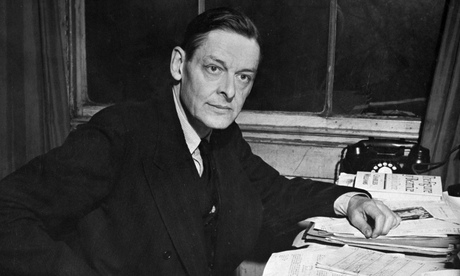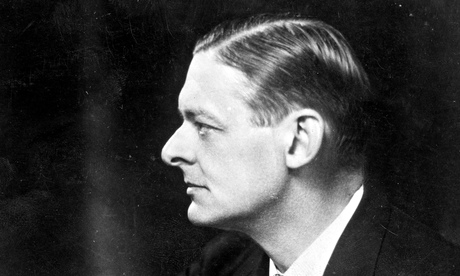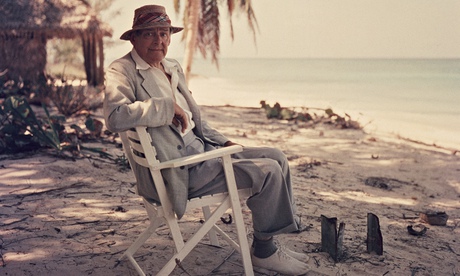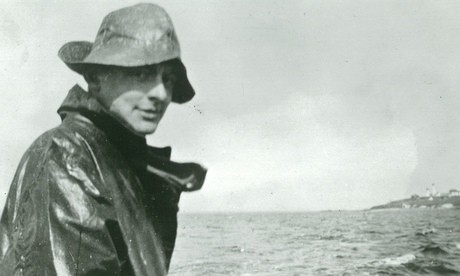Buying an edition of Dante’s Divine Comedy in Florence as a student, I was struck by its resemblance to the flood lines marked on the side of buildings to commemorate the great flood of 1966: sometimes the footnotes would creep almost all the way to the top of the page, leaving only one or two lines of actual text. Had Christopher Ricks and Jim McCue adopted footnotes rather than endnotes in their remarkable edition of TS Eliot’s poems, whole pages of apparatus would surge by with barely a line of verse in sight. Volume one contains 346 pages of poems to 965 of commentary. In the second volume, notes follow text on a poem-by-poem basis, but their combined 290 pages is still outweighed by a 367-page “textual history”. It is a monumental achievement, and one that frames important and timely questions about the state of Eliot’s reputation.
“We beg to call to your attention /Some minor problems of the soul”, protests the breeze in the early poem “Goldfish (Essence of Summer Magazines)”. Eliot’s hegira from starchy student to the Nobel laureate who packed out baseball stadiums on an American tour remains one of the most compelling and strange of modern poetic careers. The young Eliot wrote some fine poems in French, and he had his reasons, too: the poet of Prufrock and Other Observations is much more a belated contemporary of Laforgue, Corbière and Rimbaud than of the Georgians Ezra Pound was busy skewering in Hugh Selwyn Mauberley. No less than with Yeats, however, the legacy of the 1890s played its part. Eliot was extravagant in his praise for John Davidson’s “Thirty Bob a Week”, a plausible wellspring for the melancholy chambermaids and commuters that stalk his early work. Among the most important of his juvenilia is “The Death of Saint Narcissus”, a poem of guilt, humiliation and martyrdom. An obsession with drowning runs through Eliot’s writing, inspiring section four of The Waste Land (“Death by Water”). In later life he would deride his early poems, but their reservoirs of buried feelings served him well, keeping his desert places from drying out entirely. They also contain their share of genuine near-masterpieces, such as “Oh little voices in the throats of men”, almost as good in its way as “Portrait of a Lady” or “La Figlia Che Piange”.
It was the footnotes that made the difference, though. Striking terror into traditionalist hearts, The Waste Land came with notes by the author, composed at a publisher’s request but providing a handy rationale for the poem’s instalment as the cornerstone of the academic modernist canon. By 1962 Eliot appeared to have set his face against scholarship as a handmaid to the general reader: “I will not allow any academic critic … to provide notes of explanation to be published with any of my poems.” Happily, Ricks and McCue (one an academic critic, one not) are not in the business of blundering explanations, and their labours enhance, rather than usurp our experience of the poems. Another passion of Ricks’s, Bob Dylan, sustains an inexhaustible bootleg industry, and the new “Editorial Composite” of The Waste Land might be described as that poem’s Basement Tapes. Though lacking the comedy value of Pound’s marginal annotations (“Balls!”), this is high-stakes scholarship, educating the reader in the art of variorum reading.
An unspoken backdrop to this edition is the need for a salvage job on Eliot’s reputation after the sustained assaults it has suffered in recent decades. To Cynthia Ozick, writing in 1989, the once sainted Eliot stood revealed as “an autocratic, inhibited, depressed, rather narrow-minded, and considerably bigoted fake Englishman”. Anthony Julius’s TS Eliot, Anti-Semitism, and Literary Form (1995) indicted him for snide complicity in the most toxic of prejudices. Hailing Julius’s book, Tom Paulin found a “malignity” in Eliot, “because like a true politician, he never apologises and never explains”. Small aftershocks from the Eliot wars bob up here, as when the lower-case “jew” and “jews” of “Gerontion” and “Burbank with a Baedeker: Bleistein with a Cigar” are awarded a face-saving majuscule, though the lower-case “jew” of “Dirge” remains (“Graves’ disease in a dead jew’s eyes!”). “Joyce uses ‘jew’ 66 times in Ulysses,” a note informs us, pursuing an exculpatory line of argument last seen in Craig Raine’s TS Eliot: Image, Text and Context. In interview, Ricks has argued that works of art “have to be accusable”: if Baudelaire’s poems could not be accused of blasphemy, they could not be religious. By unlucky accident, Eliot’s thoughts on blasphemy are contained in After Strange Gods, his single most irredeemable book. There is no getting round it: there is a darkness in Eliot, but one with a terrible, hypnotic power.
An unusual aspect of Eliot’s fame is the relatively small number of poems on which his reputation was built – far fewer than in the case of Yeats, Wallace Stevens or Robert Frost. With some modernists, notably Marianne Moore, a hobbled or censored publication record has kept large numbers of major poems out of the public eye, and republication has significantly changed the way they are read. This is not quite the case with Eliot. What this edition does remind us, though, is how endlessly influential he is. “My words echo / Thus, in your mind”, he writes of the rose garden in “Burnt Norton”, while, in some poems – “Prufrock”, “Gerontion”, The Waste Land – the ratio of quotable lines to overall text approaches one to one. For all Eliot’s creative parsimony, the ability of his lines to sing beyond the confines of their occasions is almost unparalleled. An account of a reading Eliot gave to a student audience describes an undergraduate asking whether he wrote all the poems himself, as some of the lines from the end of The Waste Land appeared rather familiar. But is there a more personally Eliotian passage than the conclusion of “What the Thunder Said”, with its mixum-gatherum of Dante, Jacobean tragedy and Sanskrit?
A poem that has loomed large in Geoffrey Hill’s critical wranglings with Eliot is “Coriolan”, an unfinished text whose abandoned status Hill views as a tragic abdication on Eliot’s part. It is a biting satire of the British establishment, begun just as Eliot’s absorption into its heart was reaching its consummation, then dropped in favour of the insipid homiletics of “The Rock”. Another argument of Hill’s is that not just “The Rock” but Four Quartets, too, represent a decline from the unsettling “pitch” of the early work into reassuring but bogus “tone”. The argument is far from new: Samuel Beckett called Four Quartets “castrated writing”, while Donald Davie condemned the third quartet, “The Dry Salvages”, as “quite simply rather a bad poem”. “Little Gidding” remains a supreme moment in Eliot’s work, but with an unmistakably valedictory note, even though its author would live for another 20 years. Where The Waste Land shocks and astounds, “Little Gidding” proffers an impeccably civilised transcendence of the horrors of war.
A comparison with Messiaen’s Quatuor pour la Fin du Temps, also written in wartime, shows how far Eliot had deflected his art from the wilder reaches of experimental modernism. The oeuvre closes with neither a bang nor a whimper, but something closer to a priestly “Go in peace”. The official oeuvre, at least: among the very few new poems are some erotic verses on Eliot’s wife (“My fingers move softly below, to her navel / And touch the delicate down beneath the navel”), written with the crisp efficiency of a late-period Eliot blurb. A smattering of other occasional verse finds Eliot referring to himself in the third-person as “Possum”, a touch of self-consciousness unconducive to mirth. In a different category again are the “Improper Rhymes”, or poems with “words ending in -uck, -unt, and -ugger”, as he described them to Pound. One of these found its way into the Faber Book of Blue Verse in 1990, but their fantasies of sex, race and power will find few takers today. Yet here, too, the paradox abides: abject and contemptible as they are, these poems are recognisably products of the same mind that gave us “The Hollow Men” and “Sweeney Agonistes”.
The real change in our understanding of poetic modernism in recent years has come from how much more of it we acknowledge today than merely the Pound-Eliot double act. Three years before The Waste Land, Hope Mirrlees published “Paris”, a cubist collage of a long poem whose excellence did not save it from a 90-year wait for its second edition. With Eliot, the problem was maddeningly obverse: if, in his post-Nobel years, he did not fancy releasing unpublished work, where was the editor to countermand the Pope of Russell Square? Slowly, Eliot froze into a monument rather than a living, available presence; assembling a team sheet of contemporary Faber poets still devotedly labouring in the shadow of “The Burial of the Dead” would be a tall order. Ultimately, the rediscovery of Mirrlees and other eclipsed modernists alongside the behind-the-scenes Eliot should be to his advantage, too, allowing him to trade his lonely eminence for a wider poetic collective.
It is not as though his work is lacking commonality with the voices of the dead and the living. It is the ubiquitous otherness of Eliot’s voice – other when his own, his own when other – that allows the work to regenerate itself with such ease from one generation to the next. This may also be why the commentary never exhausts its material, despite reaching like Buzz Lightyear to infinity and beyond. Could the patient “etherized upon a table” in “Prufrock” have come from Gautier? Could “In the room the women come and go” derive from Christina Rossetti? Quite possibly. Vast as the apparatus is, comparison of the Ricks/McCue notes and those supplied by Ricks alone for Inventions of the March Hare, his 1996 edition of the juvenilia, reveals that, mirabile dictu, a certain scaling-back has been applied. Yet a common pattern persists. Ricks has written of his dislike of “intertextuality”, preferring “allusion”, but the Eliot echo chamber mapped in the notes is distinguished by the amount of references it turns up to Milton, Keats and Tennyson – favourite poets of Ricks – rather than to a poet such as Yeats, who is less favoured by that editor. “These fragments I have shored against my ruins,” Eliot writes at the end of The Waste Land. Might the sheer mass of allusions uncovered in Eliot’s simplest utterance be sand-bags piled against the hostile claims of canonical rivals?
As a young man making his way in London, Eliot went through a phase of signing himself “Metoikos”, resident alien. No amount of epiphanies in English country churches or relaxing into elder statesmanship ever quite overcomes Eliot’s essential strangeness, the sensation that clings to his work of not quite belonging. “I do not think that they will sing to me,” a timid Prufrock says of the mermaids, before that poem’s closing lines on the “chambers of the sea” in which we awaken and drown. Rarely have this world and the worlds beyond it entered into more thrilling poetic dialogue than in these beautiful, unsettling and incomparable poems.
• To order Volume I: Collected & Uncollected Poems for £32 (RRP £40) or Volume II: Practical Cats & Further Verses for £32 go to bookshop.theguardian.com or call 0330 333 6846. Free UK p&p over £10, online orders only. Phone orders min p&p of £1.99.










